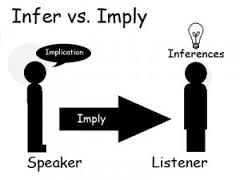记忆方法
将“imply”拆分为“im”和“ply”,想象“im”代表“隐秘”的“im”意,而“ply”联想到“play”,想象在隐秘中玩弄文字游戏,即不直接表达但间接暗示,从而帮助记忆“imply”表示“暗示”的意思。
以上内容由AI生成, 仅供参考和借鉴
中文词源
imply 暗示,暗指
im-,进入,使,-ply,编织,卷入,词源同apply,implicate.
英语词源
- imply
-
imply: see employ
- imply (v.)
- late 14c., "to enfold, enwrap, entangle" (the classical Latin sense), from Old French emplier, from Latin implicare "involve" (see implication). Meaning "to involve something unstated as a logical consequence" first recorded c. 1400; that of "to hint at" from 1580s. Related: Implied; implying. The distinction between imply and infer is in "What do you imply by that remark?" But, "What am I to infer from that remark?"
权威例句
- 1. Cheerfulness doesn't always imply happiness.
- 快活并不总是意味着幸福.
- 2. What did she imply in her words?
- 她的话意味着什么?
- 3. What do you imply by that statement?
- 你那句话有什么含意?
- 4. Tremain's novel is altogether jauntier, more various and energetic than these quotations imply.
- 与这些引文给人的印象相比,特里曼的小说总的来说更加充满自信、富于变化,也更有活力。
- 5. Their failure to reply to our letter seems to imply a lack of interest.
- 他们没有回我们的信似乎暗示他们缺乏兴趣.
